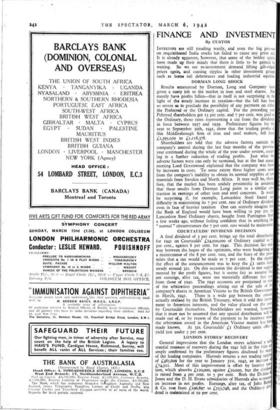FINANCE AND INVESTMENT
By CUSTOS
INVESTORS are still treading warily, and even the big pay-0u: on requisitioned India stocks has failed to cause any great Or. It is already apparent, however, that some of the bolder spirits have made up their minds that there is little to be gained by waiting. So we see re-investment demand lifting gilt-edged prices again. and causing ripples in other investment group such as home rail debentures and leading industrial equities.
DORMAN LONG SHOCK Results announced by Dorman, Long and Company hay given a nasty jolt to the market in iron and steel shares. Na merely have profits fallen—that in itself is not surprising in the light of the steady increase in taxation—but the fall has been so severe as to preclude the possibility of any payment on either the Preferred or the Ordinary capital. For the preceding year Peferred shareholders got 15 per cent. and 7 per cent. was paid on the Ordinary, those rates representing a cut from the dividend: in force between i937 and 1939. Preliminary figures for the year to September 3oth, 1941, show that the trading profits of this Middlesbrough firm of iron and steel makers, fell from £1,395,029 to £1,118,378. Shareholders are told that the adverse factors outside the company's control during the last four months of the previous year continued during the whole of the year under review, result- ing in a further reduction of trading profits. Just what the adverse factors were can only be surmised, but at the last annual meeting Lord Greenwood explained that the company was faced by increases in costs. To some extent these higher costs arose from the company's inability to obtain its normal supplies of raw materials from Sweden and North Africa. It may well be, there- fore, that the market has been unduly pessimistic in assuming that these results from Dorman Long point to a similar con- traction in earnings of other iron and steel concerns. It would be surprising if, for example, Lancashire Steel found an! difficulty in maintaining its 7 per cent. rate of Ordinary dividend, even in face of heavier taxation. One can scarcely imagine that the Bank of England would have been willing to pay 22s. for Lancashire Steel Ordinary shares, bought from Partington Sted a few weeks ago, without feeling confident that in anything like " normal " circumstances the 7 per cent. rate would be maintained.
COURTAULDS' DIVIDEND DECISION A final dividend of 5 per cent. brings up the total distribution for 1941 on Courtaulds' L24,000,000 of Ordinary capital to 74 per cent., against 8 per cent. for 1940. This decision lies mid way between the hopes of the optimists, who were budgeting on a maintenance of the 8 per cent, rate, and the fears of the peso mists that a cut would be made to 7 per cent. In the market the effect of the announcement was to keep the Li units fail! steady around 32s. On this occasion the dividend is not supple- mented by the profit figures, but it seems fair to assume that net earnings, after tax, were not materially different last year from those Oaf 1940. The 1941 accounts are postponed in via' of the arbitration- proceedings arising out of the sale of the company's shares in American Viscose to the British Governmes
in March, 1941. There is a wide gap between the amount
actually realised by the British Treasury, when it sold this invest ment to American interests, and the value placed on the as by Courtaulds themselves. Stockholders are warned? however that it must not be assumed that any special distribution will made out of, or by reason of the payment to be received wh the arbitration award in the /imerican Viscose matter- has made known. At 32s. Courtaulds' Li Ordinary units offer yield just under 5 per cent.
LONDON STORES' RECOVERY
General impressions that the London stores achieved a su
stantial measure of recovery during the 1941 lull in the blitz amply confirmed by the' preliminary figures disclosed by mail of the leading companies. Harrods returns a net trading slit?! of £485,609 for the year to January 31st, 1942, an increase £74,5". Most of this improvement is offset by heavier Lion, which absorbs LI20,000, against £50,000, but the divid is raised from 4 per cent. to 5 per cent. Both the Dickies Jones and the D. H. Evans subsidiaries of Harrods also an an increase in net profits. Earnings, after tax, of John & Co. rose from £196,897 to £253,748, and the Ordinary dead is maintained at to per cent.


























 Previous page
Previous page